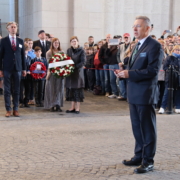Exhortation – Menin Gate, Ipres
One word played through my mind over and over again on Tuesday, as we visited Ipres, in Belgium and spent the day with missionaries from the Antwerp Zone.
…“𝐒𝐨𝐛𝐞𝐫𝐢𝐧𝐠”
Sobering – “making you feel serious or think about serious matters”
Don’t get me wrong, we loved being together all day and had some fun too, but the memories created have been sobering ones of the futility of war.
The constant reminder and experiences throughout the day, were truly sobering of the reality of the ravages of war and in particular the horrors of WW1.
Our well informed and organised guides for the day were Stephan Willems and Marnix Schotte. I am truly grateful for their knowledge, insights and experience they shared all day long.
We visited several fascinating places, museums, trenches, tunnels, a gigantic crater where a huge explosion took vast numbers of soldier’s lives.
Then on to the Christmas truce site – where we sang silent night from opposing trenches together in English and German. We then played football in memory of the game played on Christmas Day 1914.
Afterwards we travelled to Tyne Cot, where we reverently walked around a vast sprawling cemetery.
The Menin Gate
Then onto the Menin Gate where we laid a wreath on behalf of the church. I was also invited to deliver the exhortation, known the world over.
“They shall grow not old,
As we that are left to grow old:
Age shall not weary them,
Nor the years condemn.
At the going down of the sun
And in the morning,
We will remember them.”
The last line was then repeated by the vast crowd in attendance.
Since 1928, every evening at 8pm precisely, the “Last Post” has been sounded under the imposing arches of the Menin Gate.
It was an honour to participate, and it has left an indelible impression on my heart and mind.
It was a sobering sight.
Reflecting upon this day together, I am so grateful for the constant reminders that I received and will always remember.
“When you go Home, tell them of us and say,
For your Tomorrow, we gave our Today”
John Maxwell Edmunds – 1916




